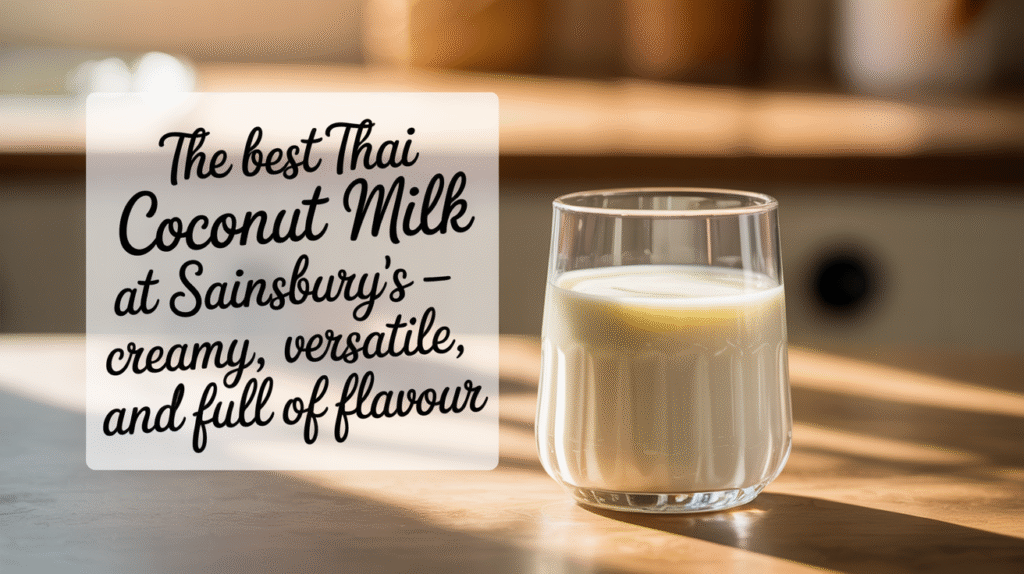The best Thai coconut milk at Sainsbury’s is the Sainsbury’s Thai Coconut Milk (400ml) tin, known for its rich consistency, subtle sweetness, and suitability for a wide range of Asian dishes. It offers both great value and reliable quality, whether you’re cooking a Thai green curry or baking a dairy-free dessert.

Let’s take a closer look at why this product stands out, how to use it in everyday cooking, its nutritional profile, and how it compares to other coconut milk options.
What Makes Sainsbury’s Thai Coconut Milk Stand Out
Sainsbury’s Thai coconut milk is sourced to meet both taste and authenticity, making it a trusted kitchen staple.
Thick, Creamy Texture with Balanced Flavour
Unlike watered-down alternatives, this version delivers a rich base for both savoury and sweet dishes.
- Ideal for curries, soups, smoothies, and puddings
- Contains natural coconut extract with no artificial flavouring
Easy to Store and Use
With its tin packaging and long shelf life, it’s suitable for meal planning or occasional use.
- Keeps for months in the cupboard
- No refrigeration needed before opening
Ingredients and Nutritional Breakdown
It’s important to understand what’s inside your coconut milk and how it supports your dietary needs.
What’s in the Tin?
The standard 400ml Sainsbury’s Thai coconut milk tin typically includes:
- Coconut extract (usually around 50–60%)
- Water
- Emulsifier (guar gum) to maintain consistency
Nutritional Highlights (Per 100ml)
Coconut milk is naturally high in fat but also rich in energy and certain vitamins.
- Energy: approx. 170 kcal
- Fat: 18g (of which saturated fat: 15g)
- Carbohydrates: 2g (mostly sugars)
- Protein: <1g
Common Uses for Sainsbury’s Thai Coconut Milk
This versatile ingredient enhances both Asian recipes and western dishes.
Cooking Thai Dishes
Coconut milk is a cornerstone of Thai cuisine.
- Used in green, red, or yellow curries for a creamy base
- Adds richness to Thai soups like Tom Kha Gai
Dairy-Free Alternatives
For those avoiding dairy, this is a great substitute.
- Replace milk or cream in baking
- Add to smoothies, porridge, or desserts like rice pudding
How to Store and Handle Coconut Milk Properly
Storage matters when it comes to preserving taste and quality.
Before and After Opening
Proper storage keeps your coconut milk fresh and safe to consume.
- Store unopened tins in a cool, dry place
- After opening, refrigerate and use within 2–3 days
Tips for Separation and Thickness
Coconut milk may naturally separate into cream and water.
- Shake the tin well before use
- Stir contents thoroughly if separation has occurred
Comparing Sainsbury’s Coconut Milk to Other Brands
Not all coconut milk is created equal, so how does Sainsbury’s option measure up?
Advantages Over Budget Brands
Some coconut milk products use excessive water or thickeners.
- Sainsbury’s offers a good balance between price and quality
- Richer texture and stronger coconut flavour than cheaper options
Organic or Premium Alternatives
There are pricier options with higher coconut extract percentages.
- Organic varieties may contain fewer stabilisers
- Sainsbury’s Thai Coconut Milk still delivers satisfying results at a lower cost
Is Sainsbury’s Coconut Milk Suitable for Special Diets?
Many shoppers look for coconut milk that aligns with dietary restrictions or preferences.
Vegan and Gluten-Free
This product is naturally plant-based and free from gluten-containing ingredients.
- Suitable for vegans and vegetarians
- Often used in paleo and keto recipes due to its fat content
Low Allergen Risk
Coconut is classified as a fruit, not a tree nut.
- Generally safe for those with nut allergies (consult a doctor if unsure)
- Does not contain dairy, eggs, or soy
FAQs About Sainsbury’s Thai Coconut Milk
Here are some questions and answers about Sainsbury’s Thai Coconut Milk:
Is Sainsbury’s Thai Coconut Milk suitable for vegans?
Yes, it contains only coconut extract, water, and stabilisers, making it 100% vegan-friendly.
Can I use this coconut milk for desserts?
Absolutely. It’s great in rice pudding, dairy-free whipped cream, and custards.
Does this coconut milk contain added sugar?
No, Sainsbury’s Thai Coconut Milk does not contain added sugar. The small amount of sugar comes naturally from the coconut.
How can I thicken my coconut milk?
You can simmer it gently to evaporate some of the water or refrigerate it overnight to let the cream rise.
What’s the difference between coconut milk and coconut cream?
Coconut cream has a higher fat content and less water, making it thicker and more suitable for whipped toppings or rich sauces.
